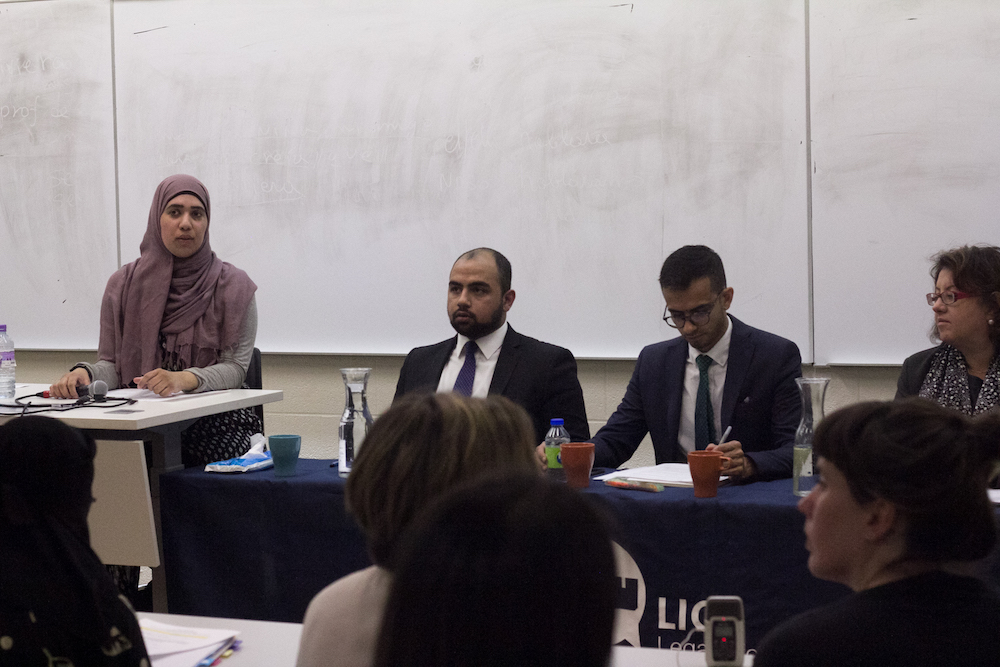Panelists suggest more National Assembly gatekeeping, more political involvement panelists suggest
Human rights lawyer Pearl Eliadis was about to leave a panel discussion on Bill 62 organized by the Concordia Student Union (CSU) early because of an obligation when she asked the panel moderator for the microphone one last time.
“When this bill was debated two years ago, where were all you guys?” she asked. Eliadis’s comments came after an attendee asked how protesters of the bill could have been more proactive.
Eliadis—an adjunct professor of McGill University’s faculty of law—answered mostly judicial-related questions in the small Hall building classroom where the CSU invited guests for the panel discussion on Nov. 1.
She sat alongside Canadian Muslim Lawyers Association (CMLA) national board member Sameer Zuberi and policy analyst Idil Issa. The latter, when asked how society should stop being reactionary to controversial legislation, sighed before uttering: “I don’t have the answer.”
Throughout the discussion, but also immediately following her question to the attendees, Eliadis urged the public to thoroughly read and study Bill 62.
Specifically, she pointed out the parts other than the second—and most publicized—section, which state: “persons receiving services from such personnel members must have their face uncovered.”
The section—named “services with face uncovered”—has been the most controversial part since the bill passed on Oct. 18. Two days after the law passed, multiple people descended on Montreal’s Park Avenue and in the metro system wearing ski masks to protest against the bill.
The panel’s organizers invited Fatima Ahmad, a McGill student who wears the niqab, to share her thoughts on the new bill and talk about her experience wearing the full face veil.
“I feel really used [and] targeted,” Ahmad told the group of mostly students gathered in the room. When Quebec Justice Minister Stéphanie Vallée said the law had passed, Ahmad admitted she “was super shocked.”
Ironically, Eliadis noted, the provincial government launched an inquiry into systemic racism in Quebec in September, just a few weeks before Bill 62 passed. “Right hand and left hand, really,” she said, referring to the disconnect within Quebec’s government.
According to Eliadis, section three of the bill, pertaining to reasonable accommodation, is just as important if not more than the ban on covered faces when using public services.
The lawyer criticized section 11.4 as an example, which states that when an institutional body deals with an accommodation request, it must make sure the request is reasonable “in that it does not impose undue hardship with regard to […] the proper operation of the body.”
“It really is ‘anything goes,’” Eliadis said, referring to the provision’s vagueness.
“Instead of making [accommodation] something that you should be doing in order to ensure that we have inclusion in this country, [the bill] says: ‘Here are all the reasons why you should not accommodate people.’”
More involvement in politics
Zuberi, a former CSU executive who also ran as a councillor under the Projet Montréal banner in 2013, encouraged the panel’s attendees to get involved in the political process.
“[It’s] because people like us are not involved in those conversations that legislations like this actually pass,” Zuberi said.
The CSU—which already motioned to condemn the bill during a special council meeting on Oct. 19—was supported by the Students’ Society of McGill University (SSMU) vice president of external affairs, Connor Spencer, and Association pour la voix étudiante au Québec (AVEQ) secretary general Rami Yahia at the panel.
Spencer said the bill should be “called for what it is: racist and sexist”.
“We do need to take a position on this. We’re students, but we’re also members of society,” he added.
“[It’s] not this piece of legislation that’s problematic, it’s the societal conversation that we’re having around this legislation that’s so damaging,” Zuberi argued.
According to Zuberi, company boards of directors and elected bodies in Montreal should also represent the city’s demographic by having the same percentage of visible minorities as in the society itself.
Issa supported Zuberi’s idea, adding that more representation from minority groups at the National Assembly could, at the very least, bring more opposition to legislation like Bill 62.
For Issa, the issue with the bill is more than political: it’s moral. “Use your moral imagination,” she said, “and try to think of what is fundamental to your character, to your beliefs, something that you hold dear, and imagine if it was violated upon every encounter with someone with institutional authority.”
Photo by Sandra Hercegova
